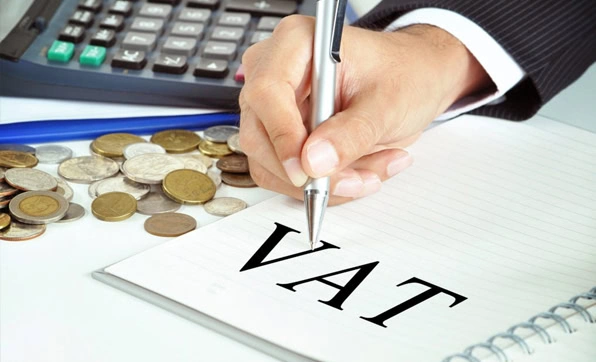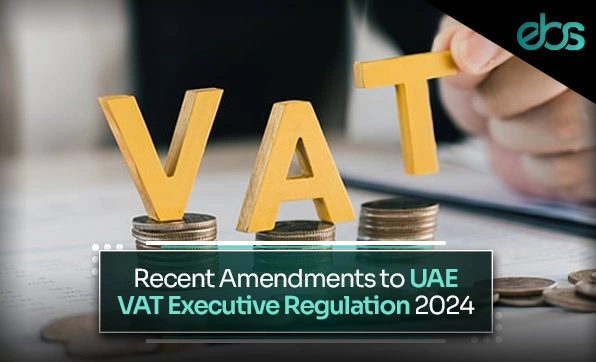The UAE has recently made significant amendments to its VAT Executive Regulation under Cabinet Decision No. 100 of 2024. Most of the changes will take effect from 15 November 2024, while some are effective respectively. These changes aim to reduce administrative burdens, clarify previously ambiguous areas, and align VAT requirements across sectors, particularly in financial services and exports. This article will discuss the role of vat consultants in Dubai in helping businesses to reassess their VAT obligations to ensure compliance with the new regulations.

Key updates focus on several critical areas:
- Export of Goods and Services: Exporters now have more flexible requirements for retaining documentation, such as customs declarations or shipping certificates, to apply for zero-rated VAT on goods exports. For services, the amendment restricts zero-rating for certain services that are consumed within the UAE, such as real estate and electronic services.
- Financial Services and Virtual Assets: A notable exemption has been introduced for investment fund management services, which were previously taxable. Additionally, virtual asset transactions, including cryptocurrency transfers and conversions, are now exempt from VAT, with retrospective application from 2018.
- Composite Supplies: New rules clarify the VAT treatment of supplies that don’t have a dominant component, requiring VAT to be applied based on the nature of the supply as a whole.
- Employee Benefits and Partial Exemption: There is relief for businesses, particularly allowing VAT recovery on specific employee medical benefits.
The following are the important amendments and their VAT implications
| Articles | Key Amendments | VAT Implications |
|
Article 3 (bis) – Exceptions of supplies |
a. The grant or transfer of ownership or disposal of government buildings, real estate assets and other projects of a similar nature from a Government Entity to another Government Entity.
b. The grant or transfer of the right to use, exploit or utilize the government buildings, real estate assets and other projects of a similar nature from a Government Entity to another Government Entity, including any granted or transferred right of use, exploitation or utilization as of 1 January 2023.
|
Transfers of real estate and related assets between government entities are excluded from VAT (Out of scope supplies) retrospectively from January 1, 2023. |
|
Article 5 – Exceptions related to deemed supply
Article 8 – Voluntary registration |
For the purposes of Clause 5 of Article 12 of the Decree-Law, the total of Output Tax payable on all Deemed Supplies shall not exceed the following:
a. An amount of AED 2,000 (two thousand dirhams) for each supplier, within a 12-month period, and any amount exceeding this threshold shall be considered Payable Tax.
b. An amount of AED 250,000 (two hundred fifty thousand dirhams) for each supplier that is a Government Entity or a Charity in case the recipient is a Government Entity or a Charity, within a 12-month period, and any amount exceeding this threshold shall be considered Payable Tax.
A Person may not register for Tax voluntarily unless he proves to the Authority that: a. he is carrying on a Business in the State, and b. he has the intention to make any of the supplies specified in paragraphs (a), (b) or (c) of Clause 1 of Article 54 of the Decree-Law.
|
If the value of the supply of the Goods (Goods were supplied as samples or commercial gifts) for each Recipient of Goods within a 12-month period, does not exceed the amount AED 2,000, then it is excluded from VAT
Deemed supplies between government/charitable entities under AED 250,000 over 12 months are excluded from VAT.
Voluntary registration requires proof of conducting business and intent to make specific supplies under Article 54(1) |
|
Article 29- Accounting for tax under Proft Margin |
The profit margin is the difference between the purchase price of the Goods and the selling price of the Goods, and the profit margin shall be considered to be inclusive of Tax.
The “purchase price” stated in Clause 4 of this Article includes, in addition to the price of the Good, any costs and fees incurred to purchase the Good.
|
The purchase price for Profit Margin Scheme now includes acquisition costs and fees. |
|
Article 30 – Zero-rating the export of goods |
The Direct Export shall be subject to the zero rate if the following two conditions are met:
a. The Goods are physically exported to a place outside the Implementing States or are put into a customs suspension regime in accordance with the GCC Common Customs Law within 90 (ninety) days of the date of the supply.
b. The exporter retains any of the following:
1) a customs declaration, and Commercial Evidence that proves the Export,
2) a Shipping Certificate and Official Evidence that proves the Export, or
3) a customs declaration that proves the suspension arrangement of customs duties, in case the Goods are put into customs suspension.
“Official Evidence” means the export certificate issued by the customs departments in the State or a clearance certificate issued by these departments or the competent authorities in the State
“Commercial Evidence” means the document issued by sea, air or land transport companies and agents, which proves the transfer and departure of the Goods from the State to outside the State, and includes any of the following documents:
1) Air waybill or air manifest. 2) Sea waybill or sea manifest. 3) Land waybill, or land manifest.
“Shipping Certificate” means a certificate issued by sea, air or land transport companies and agents as an equivalent of a commercial evidence where it is not available.
|
Businesses can now use multiple forms of evidence (customs declaration, shipping certificate, etc.) to substantiate a zero-rated export. This provides flexibility in proving exports, making it easier to claim zero-rated VAT. It reduces the risk of proving export claims due to non-availability of some relevant documents |
|
Article 31 – Zero-rating the Export of Services |
Clause 1(a) The Services are not treated as being performed in the State or in a Designated Zone under Clauses 3 to 8 of Article 30 and Article 31 of the Decree-Law.
|
Zero-rating does not apply to services where the special place of supply rules apply, including telecommunications and electronic services.
|
|
Article (42) – Tax Treatment of Financial Services |
Clause 3
The following financial services shall be exempted:
d. Fund management services described in paragraph (j) of Clause 2 of Article 42
e. Services specified in paragraphs (k) and (l) of Clause 2 of Article 42, including services supplied on or after 1 January 2018.
|
Investment fund management services, transfer of ownership and conversion of digital assets (e.g., currencies, investments) are exempt from VAT.
The VAT exemptions for digital asset transfers and conversions have been applied retrospectively from January 1, 2018. |
|
Article 46 – Tax on Supplies of More Than One Component
Article 53 – Non-recoverable Input Tax |
Clause 1 (b) If a single composite supply does not contain a principal component, the Tax treatment shall, generally, be applied based on the nature of the supply as a whole.
Input Tax shall be recoverable if it is incurred by a person where the Taxable Person provides health insurance, including enhanced health insurance, to its employees and their family members (as applicable) up to a husband or one wife, and three children younger than eighteen years.
|
Tax treatment of composite supplies follows the main component or overall nature of the supply
Input tax on health insurance for one spouse and up to three children under 18 is now recoverable. |
|
Article 59 – Tax Invoices |
Clause 13
Registrant shall issue the Tax Invoice within 14 (fourteen) days from the date of the supply provided for in Article 25 or 26 of the Decree-Law, except in the following cases:
1) where the Tax Invoice is issued in accordance with Clause 2 of Article 59, the Registrant shall issue the Tax Invoice on the date of supply,
2) for the purposes of Clause 6 of Article 59, the Registrant shall issue a summary of the Tax Invoice and deliver it to the Recipient of Goods or Recipient of Services within 14 (fourteen) days of the end of the calendar month within which the date of supply occurs for such supplies.
|
Simplified tax invoices must be issued on the date of supply and are not permitted where VAT is accounted for under the reverse charge mechanism. A summary tax invoice can be issued and delivered to the recipient within 14 days after the end of the calendar month in which the supplies took place. |
|
Article 60 – Tax Credit Note |
Where an agent who is a Registrant makes a supply of Goods and Services for and on behalf of the principal of that agent, that agent may issue a Tax Credit Note in relation to that supply as if that agent had made the supply, provided that the principal shall not issue a Tax Credit Note, subject to:
a. the agent retaining sufficient records in such a manner as to determine the name, address and Tax Registration Number of the principal supplier, and
b. the principal supplier retaining sufficient records in such a manner as to determine the name, address and Tax Registration Number of the agent. |
Tax credit notes require adjustments for multiple notes and detailed record-keeping by agents and principals. |
The recent changes to the UAE VAT Executive Regulation, under Cabinet Decision No. 100 of 2024, aim to simplify compliance across sectors like exports, financial services, and virtual assets. These updates include easier documentation for VAT-exempt exports, exemptions for managing investment funds and virtual assets, and simplified rules for reclaiming VAT on employee benefits. By hiring a VAT consultant in Dubai,UAE , businesses can carefully review these changes to ensure they follow the new rules properly.
Why Choose ebs Chartered Accountants?
ebs Chartered Accountants is right here that will help you navigate the current amendments to the UAE VAT Executive Regulation below Cabinet Decision a hundred of 2024. Our professional crew offers complete steering on information about those modifications and their implications in your commercial enterprise. We help with compliance, making sure your VAT approaches align with modern-day regulations. Additionally, we provide tailor-made answers for green VAT reporting and management, helping you limit dangers and keep away from penalties.
Trust ebs Chartered Accountants to hold your commercial enterprise knowledgeable and compliant in this evolving landscape.
FAQs
What changes were made in Cabinet Decision 100 of 2024?
It updated VAT registration thresholds and compliance requirements to enhance clarity and efficiency.
How will these amendments affect businesses?
Businesses may need to adjust their VAT reporting processes to align with the new regulations.
Are there new penalties for non-compliance?
Yes, the amendments include stricter penalties for late submissions and inaccuracies in VAT returns.
How can ebs Chartered Accountants help with these changes?
We provide expert guidance to ensure compliance and streamline your VAT processes amid the new regulations.

